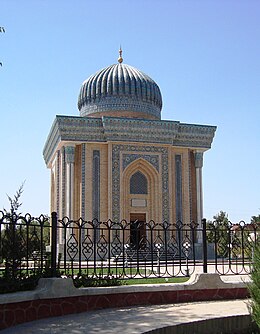Hasan Kafi Pruščak
 From Wikipedia the free encyclopedia
From Wikipedia the free encyclopedia
Hasan Kafi Pruščak | |
|---|---|
| Born | November/December 1544[1] Prusac, Bosnia Eyalet, Ottoman Empire |
| Died | 9 October 1615 (aged 70)[2] Prusac, Bosnia Eyalet, Ottoman Empire |
| Language | Bosnian, Ottoman Turkish |
| Notable works | Nur al-Yaqin fi Usul al-Din (Commentary of al-Tahawi's epistle on Islamic creed)[3] |
Hasan Kafi Pruščak (November/December 1544 – 9 October 1615) was a Bosnian Hanafi scholar, philosopher, historian, writer, poet, Maturidi theologian, philologist and "qadi" (judge) who studied in Bosnia and Istanbul.[4][5]
He is considered to be the most significant figure of the area's scientific, cultural and intellectual life in the 16th and early 17th centuries, as well as one of the most important Bosnian thinkers.[6]
| Part of a series on |
| Maturidism |
|---|
 |
| Background |
Birth[edit]
He was born in 1544 in Prusac, studied in Istanbul, and from 1583 he was a judge of Prusac.[7][8]
Works[edit]
Basis of Wisdom on the Organization of the World is the most significant of his seventeen works. In this work, Pruščak deals with the key issues of the Ottoman Empire at the time and the study was meant to: "help the rulers, guide the viziers, be a role-model for the wise and support for the poor."[9]
Background[edit]
Pruščak hailed from the village Prusac near the Bosnian town of Donji Vakuf. He attended elementary school in Prusac before relocating to Istanbul where he studied for nine years. He returned to his hometown in 1575.
He went on the Hajj to Mecca in 1591.
See also[edit]
- Mustafa Ejubović
- Damat Ibrahim Pasha
- Sokollu Mehmed Pasha
- List of Hanafis
- List of Muslim theologians
- List of Ash'aris and Maturidis
References[edit]
- ^ "Islamic Studies; page 275". 2002. Retrieved 25 August 2014.
- ^ Ljubović, Amir; Grozdanić, Sulejman (1995). "Prozna književnost Bosne i Hercegovine na orijentalnim jezicima; pages 25, 65 & 72". Retrieved 25 August 2014.
- ^ "Hasan Kafija Pruščak: Istaknuti učenjak o kojem se malo zna". vijesti.ba (in Bosnian). Archived from the original on 15 Mar 2023.
- ^ Mario Katic, Tomislav Klarin, Mike McDonald (2014). Pilgrimage and Sacred Places in Southeast Europe: History, Religious Tourism and Contemporary Trends. LIT Verlag. p. 119. ISBN 9783643905048.
{{cite book}}: CS1 maint: multiple names: authors list (link) - ^ Brinkmann, Stefanie (2009). From Codicology to Technology: Islamic Manuscripts and Their Place in Scholarship; page 178. Frank & Timme GmbH. ISBN 9783865961716. Retrieved 25 August 2014.
- ^ Mario Katic, Tomislav Klarin, Mike McDonald (2014). Pilgrimage and Sacred Places in Southeast Europe: History, Religious Tourism and Contemporary Trends. LIT Verlag. p. 119. ISBN 9783643905048.
{{cite book}}: CS1 maint: multiple names: authors list (link) - ^ Mario Katic, Tomislav Klarin, Mike McDonald (2014). Pilgrimage and Sacred Places in Southeast Europe: History, Religious Tourism and Contemporary Trends. LIT Verlag. p. 119. ISBN 9783643905048.
{{cite book}}: CS1 maint: multiple names: authors list (link) - ^ Ljubović, Amir (2008). The Works in Logic by Bosniac Authors in Arabic; page 27. BRILL. ISBN 978-9004168565. Retrieved 25 August 2014.
- ^ Mario Katic, Tomislav Klarin, Mike McDonald (2014). Pilgrimage and Sacred Places in Southeast Europe: History, Religious Tourism and Contemporary Trends. LIT Verlag. p. 119. ISBN 9783643905048.
{{cite book}}: CS1 maint: multiple names: authors list (link)
